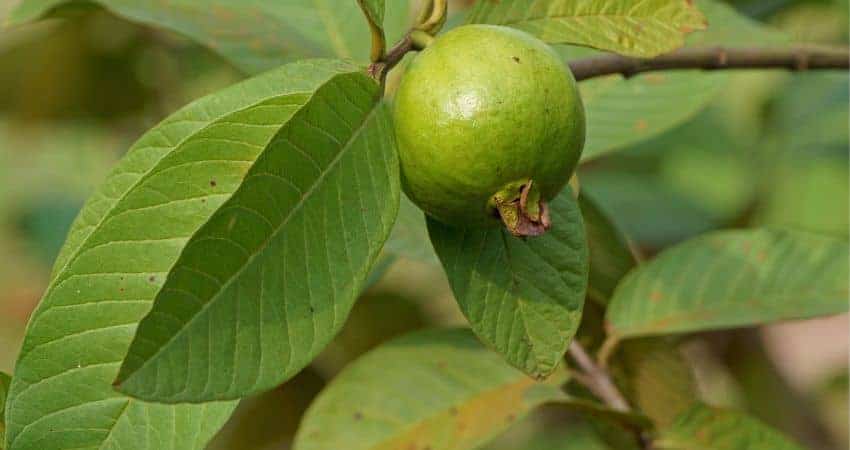Guava Calories: Interesting Facts About Guava Fruit
The amount of calories in a Guava will vary based on the variety, size and where the Guava furit is grown.
The average serving of guava contains 112 calories. The Calories in one Guava fruit serving represents 6 percent of the recommended daily intake (RDI) of calories for the average person.
In total the average serving of Common Guava fruit equals 11% fat, 75% carbs and 13% protein of your recommended daily intake (RDI).

Guava Carbs
In addition to the calories in a guava, the, total carbs in a guava fruit is about 23.65g. This is roughly 9 percent of the recommended daily intake of carbohydrates for the average person.
And the average serving of Common guava provides 4.21g of protein, 8.9g of dietary fiber, 14.72g of sugar, 1.5g of fat.
Calories In Guava Juice
Ab 8oz. glass of Guava juice has 144 calories.
Other nutritional benefits of that same glass of Guava juice include Fat, 0.2g, Sodium 18mg, Potassium 195g, total carbohydrate 37g.
It provides 82 percent of your daily Vitamin C your body needs.
Guava Calories -100g
| Nutrient | Amount | %RDI |
|---|---|---|
| Calcium | 30 mg | 2 % |
| Cholesterol | 0 mg | 0 % |
| Sodium | 1 mg | 0 % |
| Vitamin C | 376.7 mg | 419 % |
| Iron | 0.43 mg | 2 % |
| Potassium | 688 mg | 15 % |
Strawberry Guava
There are other species that are called Guava but they are not “true” guava. Strawberry guava is one of them.
The biological name for Strawberry guava is Psidium cattleianum. Strawberry Guava produces clusters of smaller dark red fruits. Many Jamaicans call them mountain guava.
They have a softer white or yellow Strawberry flavored pulp. The inside is just as seedy as “true” varieties of guava.
Strawberry Guava Nutrients
Straberry Guava is a nutrient rich fruit as well. Just like other Guavas the amount of calories in a Strawberry guava varies.
However’ the average Strawberry guava has these nutrients: 1.5g of Fat, 42.4g of carbs, 1.4g of protein, 196.8g of water and 13.2g of dietary fiber.
In additions, one serving of Strawberry guava has these much needed minerals: 21mg of Calcium, 0.22mg Iron, 17mg Magnesium, 27mg, Potassium 292mg and 37mg Sodium.
In fact, one study determined that the Jamaican Strawberry guava variety was superior to common Guava in some ways.
Strawberry guavas were found to be superior to common guavas in antioxidant and antimicrobial activities, total phenolics and vitamin C content. They also possessed relatively high fibre content.
Source: sciencedirect.com

Guava Benefits
- Vitamin C 90.3mg
- Vitamin B3 1.5mg
- Calcium 51.2mg
- Magnesium 41.5mg
- Phosphorus 65.9mg
- Potassium 712.5mg
Types of Guava
There are some 30 varieties of Guava. Different types of Guava grows in different areas. However, the most well known variety of guava is Common guava.
Common guava is also known as Yellow guava or Lemon guava.
Guava is native to the tropical and subtropical regions of the Americas and the Caribbean.
Guava’s botnaical name is Psidium guajava. Biologically Guava fruit iis classified as a berry. Since most guava trees look the same, different types of Guava are identified by the appearance and flavor of the fruit.
Common guava fruits are round or pear shaped. The young fruits have green or lime green, rough textured skin. As the berries ripen the skin turns a lighter shade of green or yellow.
Some Guava varieties retain their green color even when the fruits are ripe. Both the tree and the fruit emits a strong musky smell.
One major difference in the varieties of Guava fruits is the pulp. Guava pulp can be white, yellow, pink or even reddish in color.
The taste of the different types of Guava vary too. Some types taste sweet while others have a salty taste. Some are even slightly bitter near the skin.
The one similarity is that the inside of a Guava fruit is filled with hundreds of small, hard, edible seeds.
Benefits of Guava
Research suggest that Guava fruit and leaf extracts may offer a number of health benefits.
Some studies suggest that guava works to lower blood pressure, reduce bad cholesterol and reduce blood sugar levels.
There are no calories in one cup of unsweetened guava tea. But it does provide 20 percent of the Vitamin C and 2 percent of Iron recommended for daily consumption.
Guava tea delivers other possible health benefits. For instance Guava is used as a home remedy for these ailments:
Treating Diarrhea. Some studies have validated the use of guava tea as an effective treatment for diarrhea.
Reduce Blood Sugar. One study of 20 adults with type 2 diabetes found that when they drank guava tea after a meal, their blood sugar levels went down by more than 10 percent.
Boost Immunity. Vitamin C is an abundant nutrient in guava. In fact one average sized Guava fruit delivers two times the Vitamin C you get from eating an orange.
Vitamin C is needed to help build the body’s immune system. So, cup of Guava tea may give you all the vitamin C you need for the day.
Disclosure: This article may contain affiliate links. It means if you buy something by clicking on a link, I may be paid a small commission. Thank you!
Guava Leaf Tea
Guava tea is made from either the fruit or leaves. The dried leaves are the most common form commercially available for making tea.
Here’s how to make Guava leaf tea.
Pour 2 cups of water into a pan and bring it to a boil. Wash 5 to 7 dried guava leaves. Put them in the boiling water and lower the flames.
Let simmer for about 5 minutes. Remove from flames, strain and serve warm or cold.
You may add a sweetener but keep in mind this will increase the calorie count.
Conclusion
Where to buy guava products. You may purchase fresh guava products from local framers markets.
You may also buy different formulations of products from online stores such as Etsy and Amazon.
There are no known reports of serious side effects of consuming Guava.
So whether you choose to eat the fruit, or drink guava tea or juice, go ahead and enjoy a fat free, low carb, low cholesterol natural treat.
In additional to low calories, guava products may deliver a number of other health benefits.
Disclaimer: This website is for informational purposes only. Nothing on this site should be viewed as medical advice. Please consult with a professional healthcare provider for matters to do with your medical care.
